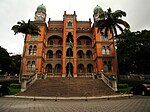Manguinhos Library Park

Manguinhos Library Park (Portuguese: Biblioteca-Parque de Manguinhos) is a library and park complex in Rio de Janeiro, Brazil. The library opened on April 29, 2010. It contains over 25,000 books, 900 DVDs and 3 million songs, and also has a theatre that seats 200 people, a music room, classrooms, and a “Meu Bairro” ("My neighborhood") room created for community member meetings. It is located in Manguinhos, a favela in the neighborhood of Benfica. Benfica is in what is known as the "North Zone" of Rio de Janeiro. The creation of a "library park" complex was inspired by the library parks of Colombia, which were created as cultural projects in the less affluent neighborhoods of Medellín to promote social inclusion. The library's design is meant to be inviting. Its exterior is painted dark-pink with white doors and windows.The Minister of Culture, Juca Ferreira, and the governor of Rio de Janeiro, Sergio Cabral, attended the inauguration of the first library park.
Excerpt from the Wikipedia article Manguinhos Library Park (License: CC BY-SA 3.0, Authors, Images).Manguinhos Library Park
Rio de Janeiro Benfica
Geographical coordinates (GPS) Address Nearby Places Show on map
Geographical coordinates (GPS)
| Latitude | Longitude |
|---|---|
| N -22.8864 ° | E -43.249 ° |
Address
20911-300 Rio de Janeiro, Benfica
Rio de Janeiro, Brazil
Open on Google Maps



